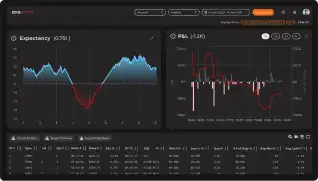
December 06,2024 @10:23 AM
Trading futures and stocks can be compared to navigating different terrains. Stocks are like hiking up a steady trail, where progress comes gradually with time and patience. Futures, on the other hand, involve exploring unpredictable landscapes—sometimes moving quickly over volatile ground, and other times requiring careful planning for longer-term strategies. While stocks often cater to slow and steady growth, futures offer more flexibility for both rapid and extended approaches to the market.
Stock and futures both present market opportunities toward long-term profits in unique ways, but they also involve significant risks of loss. If you have ever wondered whether you should dive into futures or stock, having an understanding of their mechanics is essential. Let’s explore their key differences to help you make a more informed choice about what kind of trading is for you.
Leverage and Capital Efficiency
One of the most appealing aspects of futures trading for many traders is the leverage that it provides. With futures, traders can control large market positions with a fraction of the capital required. For instance, controlling a $100,000 futures position might only require a $10,000 margin deposit, allowing traders to amplify their returns. However, please note: the lower the margin, especially Day Trading Margins, the higher the leverage the greater the risk. Higher leverage exaggerates gains and losses
In contrast, when trading stocks, traders typically need to pay the full purchase price upfront unless using a margin account, where leverage is more limited compared to futures. Even with margin, stock traders can commonly only borrow up to 50% of the stock’s value.
This capital efficiency is a big reason why futures appeal to both experienced traders and those with smaller accounts looking to make the most of their capital. However, it is extremely important to remember that leverage works both ways—while it can amplify gains, it can also magnify losses. This is why traders using leverage must be disciplined and have strong risk management practices in place.
Expiration Dates and Active Management
A key characteristic of futures contracts is that they have expiration dates, which calls for traders to actively manage their positions. As the expiration approaches, you will need to decide whether to close your position or roll it over into a new contract with a later expiration. Traders are made aware that this incurs commissions and fees like any other trade since it involves closing a position and opening a new one. However, this added level of active market management can be appealing to short-term, fast-paced traders who thrive on a market movement.
Stocks, in contrast, have no expiration. Once purchased, you can hold them for as long as you want, making them ideal for long-term investors. However, this long-term approach may not suit traders seeking frequent opportunities or quick market reactions, which futures can provide.
Broader Market Access and Diversification
Futures trading provides a gateway to a wide array of markets. Traders can speculate on commodities, currencies, financial indices, and even interest rates. This broad market access gives traders an edge when it comes to diversification, allowing them to spread their risk across different asset classes. For example, a trader might hedge risks in the energy market by taking positions in both crude oil and natural gas futures, while simultaneously trading currency futures to hedge against global currency fluctuations. However, it’s important to understand that markets are inherently unpredictable, and hedge positions can still result in significant losses.
In contrast, stock trading limits your market exposure to company performance. While buying stocks in multiple sectors can offer some diversification, it pales in comparison to the global reach and variety offered by futures markets. Futures trading allows traders to hedge risk by taking positions across different markets, creating more flexible and diversified strategies.
Nearly 24-Hour Trading
Futures markets operate around the clock, offering nearly 24-hour trading. This gives traders the flexibility to react to global news in real-time, regardless of when or where it occurs. Most futures markets are open 23 hours a day, five days a week, meaning traders can enter and exit positions whenever market conditions change, regardless of their time zone.
Stock trading is generally limited to standard U.S. market hours (9:30 AM to 4:00 PM ET). While some brokers offer extended hours, these periods often come with lower liquidity and wider bid-ask spreads, making execution more challenging. The nearly round-the-clock nature of futures markets provides a notable advantage for traders who want to adjust their positions in response to global news or overnight market shifts.
Liquidity and Volume
Certain futures markets, like the E-mini S&P500, and crude oil, are known for their liquidity. This means that traders can enter and exit large positions without significantly affecting market prices. This liquidity is essential in fast-moving markets where quick execution is critical.
While large-cap stocks are also liquid, many futures equity indexes trading on CME exchange provide ample liquidity. This makes futures an attractive choice for traders that value the ability to move large volumes efficiently, especially during volatile market conditions.
Futures trading offers traders both notable advantages and risks, making it powerful for those who can harness it properly. On one hand, futures provide unique opportunities, such as access to a wide variety of markets and the ability to leverage trades. On the other hand, futures also introduces challenges, such as amplified risk through leverage and the intricacies of managing expiration dates. Having a strong understanding of both the benefits and drawbacks is essential when considering if futures trading aligns with your trading goals.
Advantages of Futures Trading
- Leverage for Enhanced Returns
Futures trading allows for greater leverage, meaning traders can control larger positions with less capital. This feature not only provides the potential for greater returns but also gives traders access to markets they might otherwise be unable to participate in. However, it is important to note that leverage cuts both ways, magnifying both gains and losses.
- Favorable Tax Treatment
For United States traders, futures come with a distinct tax advantage under IRS Section 1256. This provision taxes gains from futures contracts as 60% long-term capital gains and 40% short-term capital gains, regardless of the holding period. This can result in a significantly lower tax bill compared to other types of trading, where gains are often taxed at higher ordinary income rates.
- Flexibility and Continuous Market Access
One of the most attractive features of futures trading is its high level of accessibility. Unlike the stock market, which operates within fixed trading hours, futures markets remain open for the majority of the day. This flexibility is key for traders looking to capitalize on market movements outside of standard hours.
Disadvantages of Futures Trading
- Amplified Risk with Leverage
As discussed earlier, while leverage can increase returns, it also heightens risk exposure. Even one small unfavorable movement within the market can lead to substantial losses due to the high degree of leverage involved in futures trading. For this reason, it is very important for traders to implement effective risk management strategies.
If you would like to learn about vital trade discipline techniques to improve your risk management, read the article that I wrote here.
- Expiration Dates Adding Complexity
Expiration dates attached to futures contracts require traders to remain vigilant in managing their positions. If a trader holds a contract through its expiration date, they may be required to complete a physical delivery of the underlying asset, such as a commodity. This could be costly and impractical for many traders and creates an added layer of complexity compared to stocks, which don’t expire.
- Market Volatility
Futures markets can be highly volatile, especially those involving commodities like oil, natural gas, or agricultural products. Prices can swing dramatically due to unforeseen events like natural disasters, geopolitical instability, or sudden shifts in supply and demand. While this volatility can offer profit opportunities, it also increases the likelihood of experiencing significant losses.
Is Futures Trading Right for You?
Futures trading can offer traders a dynamic, fast-paced approach to the markets with unique benefits. However, with these advantages comes a heightened level of complexity and risk that may not be suitable for every trader.
At the end of the day, the choice between futures and stocks comes down to the discretion of each individual trader. When making a decision, be sure to consider what type of trading would work best with your trading style, risk tolerance, and market objectives. Both asset types offer pathways to profit, but they operate on different terms. Taking the time to assess your long-term financial goals and trading preferences is essential before deciding which path to take.
As with any journey in the markets, understanding your needs and aspirations are crucial. Whether you are drawn to the fast-paced world of futures or the more measured strategy of stocks, the key to success lies in aligning your approach with your unique trading style. Both roads offer potential for growth—choose the one that best fits your goals.
Disclaimer: Derivatives trading involves substantial risk of loss, it is not suitable for all investors. The views expressed are personal opinions and should not be interpreted as financial advice.
